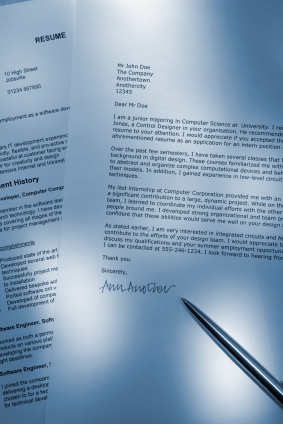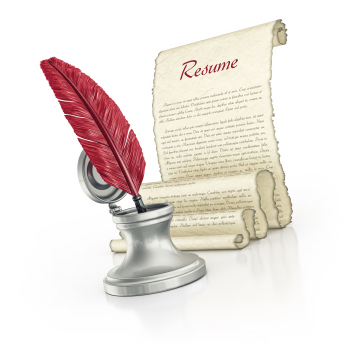
Many job seekers stress over cover letters more than they do their own resumes. It may surprise some, besides cover letters are typically a one-page preface to your intricately prepared resume. But, the truth is, that your resume may look dull without a good cover letter to introduce it. Cover letters introduce you to HR managers and set the tone for how your resume will be received. You can have a perfect resume, but if the cover letter is not well done, then your resume will not get the type of attention it deserves. Everyone looking for a job should have a professional cover letter and resume in order to find the career that’s right for them.
When you first enter the job market (most of us at around 21 years of age) don’t know how important cover letters are for you, much less how to write one that sells you. Many people are not aware of the benefits that a simple, well-crafted cover letter to a prospective employer can have. They introduce you to your prospective employer, but also they give a glimpse of your personality.
Just a few weeks into your job search, you will realize that a well-crafted cover letter is not an option, it’s a necessity. Through the support of a professional resume and cover letter writer, you can finally have the cover letter that sells your individual personality and traits. If you have a cover letter, it could always use another eye on it in order to see where you can make changes or additions. You want to sell yourself in your cover letter, your resume speaks to what type of experience and qualifications you have, that’s why it’s important to have a cover letter that sets you apart.
But, just having one is usually not enough. After a few weeks or months of unanswered applications and fruitless job searches, you begin to come to a final conclusion.
When you, or your cover letter writer, writes your first letter, the primary focus is on presentation and the format. How long should the cover letter be? Where to assign the date? What type of font is right for my cover letter? But, throughout you want to focus on one thing – quality content. If your cover letter is full of buzz words or just inane babble, then it’s not worth the paper it’s printed on.
It’s always important to remember, before you start writing, that content is king. It’s fairly easy to lose sight of what’s important and lose focus instead of paying attention to what’s important. That doesn’t mean that there are not guidelines to follow, but your cover letter writer can help you deal with the details. You do not want to have spelling or grammatical errors in your cover letter. That’s an instant turn off to any prospective employer. Remember that the main point of your cover letter is to get noticed and sell yourself.
Constructing a Resume That Sells You
BlogCareer & WorkplaceExecutive ResumesJob SearchProfessional ResumesResume KeywordsResume WritingResumesSuccess Strategies

Some people think that resumes are nothing more than a list of your accomplishments, the jobs you’ve had, and the number of places you’ve worked. But, it’s not that easy to construct a resume that markets you to your prospective employer. A resume should be designed to sell you and your potential to an employer. That means that you have to make decisions about how to present your traits.
A resume has to be like an advertisement, it needs to catch the reader’s eye and meet their particular needs. If you’re applying for an accounting job, then you wouldn’t need to showcase your creative writing talents on your resume. You would need to show that you have the skills required to perform the duties of the position at a high level. That doesn’t mean putting everything you’ve ever done on your resume, it just means you have to understand your market and how to reach them. Make sure you put your best foot forward.
Look over your work history and pick the selling points that best highlight your value. Depending on the position, you should highlight specific skills that you have. Deciding what makes the most unique selling points can be the hardest part of writing a resume. Here are five basic steps to help design a resume that markets your skills to employers:
1. Choose the most relevant information first. Focus on the skills and experience that are most important to the job you’re applying for. You may have a whole range of skills, but focus on the ones that are most important for your particular employer. Even if you’re qualified based on past experience, don’t put all of your eggs in one basket. Instead, make sure that you focus on the skills that are going to set you apart from other potential employees.
2. Showcase the cutting edge, without too much emphasis on the outdated. More experienced workers should focus heavily on this. Any professional should continue to update their resume with new talents and show that they can adapt to new challenges. You may know the beginnings of C+ language, but it will help if you know Flash or Linux.
3. Tangible examples are best. Be specific as possible and use tangible evidence of improvements if you can. Just saying that you have an excellent track record of improving sales doesn’t show much, you need to show actual figures.
4. Use multiple resumes to market yourself in a different manner. If you’re applying for several different types of positions or in different industries, you need to have a resume suited to that profession. So create several different resumes that highlight your skills for that particular position.
5. Get a second opinion. This is perhaps the most important thing you can do. It can be hard to be objective about your career. Give your resume to a friend or a family member, or if you have someone in your industry – even better.
Putting the Right Social Media Face First
BlogCareer & WorkplaceJob SearchNetworkingProfessional ResumesResume KeywordsResume WritingSocial Marketing/Online Branding

Face-to-face networking is incredibly important, and if you know your way around, then you have a distinct advantage over much of your competition. You’re making a serious mistake if you do not have a social media presence or if you skip social media sites all together.
If you’ve neglected to create a social media presence, especially on LinkedIn, then you are missing out on an incredible opportunity to find open positions. Targeted, extensive networking is still the number one way to find a job, to achieve this you need to have a complete and up to date profile on several social media sites.
The reason social media is so important is because 83% of employers look to LinkedIn, Facebook and Twitter when looking for new hires. 89% rely exclusively on LinkedIn to fill their empty positions. So if you’re not using social media, then your chances of getting a job are seriously diminished.
Without a solid social media presence on LinkedIn, you make it much harder for HR managers who are looking for you specific skill set to actually find you. Employers will also review your social media sites to examine more information after they have received your resume. So you have to take the necessary steps to stand out and never put a bad face forward.
Here are some tips for putting the right social media face first:
1. Think of your online profile as your brand.
Identify your abilities that set you apart from other applicants. You should define the areas where you excel, and always make a solid case for the value that you bring to a prospective employer.
2. Use your online profile to showcase your skill set.
On Facebook and LinkedIn, there is a headline below where you put your name. This is an incredible important part of your branding, you need to put something with keywords HR mangers will instantly gravitate to. Your headline should show a range of what you are capable of doing.
3. Position yourself as the expert in your field.
Include searchable keywords in your social media profile so that HR mangers can see your in depth experience and talents. Employers will often look through social media sites in search of a fit for a specific problem, if you have your expertise highlighted, then you may be the one they’re looking for. This makes it much easier for them to find you.
4. Clear up any discrepancies between your resume and your social media profiles.
Make sure your dates of employment, job titles and other extended details match your resume. HR managers will not contact prospects who have inconsistencies on their resume and social media profile.
5. Join Facebook or LinkedIn groups that are associated with your field.
Who knows, by commenting on a group post or by offering your advanced knowledge, you could attract someone looking for your particular talents. Answering questions in these groups is an excellent way to attract attention to yourself, just make sure you approach groups with the correct mindset, you’re trying to garner the right attention. So make sure you know what you’re talking about.
What Are Your Options Once Your Short Term Job Ends?
BlogCareer & WorkplaceJob SearchNetworkingResume Writing

Is your current contract about to end? Do you have options once it ends? Everybody has things that they believe will happen, but are those options realistic? If not, then you should start to develop some specific options and have them available by a certain date. Your contract is ending so you need multiple options in case one, or all of them, falls apart.
Your career obviously has options if you’re working on a contract basis, so start searching for the options that fit with your skill set. How many working professionals actually have a clear-cut set path that they would like to follow? How many options do your coworkers have after their job ends?
If you do not have any options once your contract ends, then you need to start developing some career options quick.
Why do you need career options? The job market is tough, but there are still other things that you can do to broaden your horizons. When you have a long-term contract it seems like you don’t need a long list of options, but if you’re working on short-term jobs, then you always have to keep an eye open for something new.
Your career is like a long winding road trip. You may not know the destination but you know where you started from, you know where you want to go, sure there may be detours along the way, but eventually you will want to have a clear destination. If you don’t have all of your options mapped out, then that should be your top goal. So, what are some of your options after your short-term job ends?
1. You could get another short-term contract
If you’ve always had short stays at companies for contract work, then you might be more comfortable working in this manner. This can be a great way to make money and still have your freedom…if you have the stomach for it. And sometimes it can be hard to find another job if your contract ends quickly.
2. Go for a long-term company
If you’re tired of looking for work every 6 months, then why not find a traditional 9 to 5 job? Depending on your chosen field, you could have many different options in a lot of different companies. If you have an accounting degree you’re basically set to work at any company, as long as they need someone to do their taxes, then you’re their person.
3. Try a different profession
What if you feel stagnant during your current work? It doesn’t mean you have to swear off that type of work forever, but you might want to consider a change of scenery. Moving to a different position within your short-term contract employer may provide other options.
4. Extending your contract
If you and your contract employer have a solid working relationship and you like where you’re at, then why not stay there? They obviously could use your talents, so talk to the HR manager about what can be done.
5 Reasons Your Job Search is Still Going
BlogCareer & WorkplaceExecutive ResumesInterviewingJob SearchNetworkingProfessional ResumesResume WritingResumes

In order to advance your career and get your job search back on track, there are a few things that you must do correctly. As a job seeker, finding a job should be your full-time job. Many people work tirelessly to find a job, but they keep coming up short, so today we’re going to have a look at the 5 reasons that your job search is still going and why you’re not getting the response that you feel you should. If you find yourself doing any of the following, then today is a great day to take action.
1. You do not make your job search personal
What this means is that you’re still sending out generic resumes with no target. Instead, get personal. Find the names of HR Managers, company directors or anyone involved in the hiring at the company. Then you send them a personalized note with your custom made resume to their company explaining your desired position and how you could help the company.
2. You are looking in the same place as everyone else
One thing you have to keep in mind is that there are a lot of unemployed people right now. Many of these people will be looking in the exact same field, geographical area or they have the same skill level as yourself. One way around this is to find opportunities through networking, online job searches and by using job boards to find hidden career options. If everyone is looking in the same place, it will only drown out your voice. Be different and look at all of your options.
3. You believe every word you hear about the recession
If you think everyone is living hand to mouth, then you are very mistaken. America has a lot of opportunity for people who are willing to look. Yes, it’s tougher than usual, but not impossible to find a job that suits you. Take a few minutes to review the positive aspects and reduce your stress level. An open mind will lead towards an open job.
4. Poor email etiquette
Every time there is a job fair, we see this problem emerge. People do not read their emails and proof them, but you can bet that your prospective employer is reviewing every little detail about your resume. Misuse the word “your” in place of “you’re” and it’s a dead giveaway that you did not proof your email. Another way that people send out poorly written or constructed emails is if they do not have a subject, have a subject line that reads, “have a look at my resume” or poorly written opening lines in the email. Try to show a little patience and take some time to review your emails before you send them.
5. You’re not as productive as you believe
Sending out a few resumes during the morning and then taking the rest of the day to watch some TV is not a productive job search. Get into the habit of diligently looking for a job. Make yourself a schedule and stick to it. All you have is you. So, work hard and you will find the right career for you.
What Separates Good Resumes from Bad Resumes?
BlogCareer & WorkplaceExecutive ResumesJob SearchProfessional ResumesResume KeywordsResume Writing

Resumes mean so much to hiring managers. It’s your first introduction to a prospective employer and it’s how you differentiate yourself. But what separates the bad resumes from the good ones?
The best resumes avoid abbreviations. Abbreviations are not professional nor are they accepted. Nothing makes HR managers cringe more than seeing sentences like the following: “Answered the phone and went 2 C clients” (yes, I truly have seen this). It may be the information age but this is not a text message so don’t treat it as such.
Giving up too much personal information is a no-no. You should leave off anything related to hobbies or interests that are not related to the job. Do not include your weight and height unless you’re applying for a position as a gym trainer. If it’s not related to the job in any way, do not include it on your resume. Leave out your illnesses or why you took off 2 years to care for a dying parent. As hard as that may have been, it will count against you.
The best resumes are the best because they’re not being used as an art canvas. If you try to stand out by having large graphics on your resume it’s a bad move, because this will give you an unprofessional and amateurish looking resume. Your prospective employer only wants to see your skills, your duties and achievements. You’re not going to get anywhere by having a Word Art picture of a snail on your resume.
Keep the negativity to yourself. The best resumes are neutral in tone or highlight the best attributes of the applicant. But, if you have information on your resume that is negative, such as, leaving your previous employer because you did not like the boss, just keep that part to yourself. Do not try to explain the situation on your resume. That’s an impossible battle that you should not fight. Your resume’s job is to sell and promote you. So don’t eliminate yourself because you were negative.
Good resumes include dates. Do not make an HR manager have to guess. This kills your resume on the spot. You have to include dates. What years were you in college, did you attend graduate school or did you graduate from a trade school? How long have you been working at your current position? Do not make the hiring manager have to ask questions about your resume. The second they have to guess, your resume is going straight to the trash. Make sure your resume flows easily and there are no date gaps. If you took a year off to go travel or to go back to school, include this on your resume.
Bad resumes do not highlight achievements. Many people will fill their resumes with irrelevant information, but they leave off the most important part of the resume – focusing on their achievements. You want to stand out from other applicants, so how can you do that if you do not showcase what you’ve done. Explaining your past accomplishments means that the HR manager can see what you’ve done and know how you can fill their need. If you have the abilities, you need to showcase them on your resume.
Drawing Attention to Your Accomplishments: What Your Resume Says About You
BlogCareer & WorkplaceExecutive ResumesJob SearchProfessional ResumesResume KeywordsResume WritingResumesSuccess Strategies

Focusing on your experience, your background and your accomplishments is what’s known as a functional resume. Chronological resumes list all of your employers in the order of the date that you worked for them, typically with the oldest employer at the bottom of the resume. Functional resumes are great for people who are looking to make a career change, people with multiple positions with different industries, people with gaps in their employment and those just starting out on their career. However, as always, I have to warn you that recruiter and hiring people really don’t like functional style resumes. They feel you may be “hiding” something.
You can combine both resume types to give yourself a well-rounded appearance to potential employers, plus hiring managers love to see a list of previous experience, especially when it’s for a position of authority. Providing work history is an excellent way to showcase how your accomplishments have translated to actual success in the work place.
Start by writing a list of the skills that you used at your previous jobs. List them one by one so that you cover a wide range of tasks on your resume. Depending on the position you’re applying for, modify your skills to directly reflect those of the position that you’re applying for. Don’t embellish, instead focus on what you’ve accomplished and how it will allow you to succeed at your new position.
Use bullet points to provide a concise and accurate depiction of your responsibilities and where you used your skills. List our your accomplishments and try to use numbers to demonstrate an actual value. You can say something like, you promoted better paper management and turned your office into a green office, reducing the waste and lowering cost for trash maintenance by a third. Or that you increased sales in your office by 15% over a 5 year period.
Show your employer in the bullet section of your accomplishments. You want to be able to match your accomplishments with a tangible company, so make sure to list the companies where you worked. Your accomplishments only mean so much if they can be backed up. Listing your companies, or contacts you may have done a project for, will help highlight your accomplishments.
Use action verbs at the beginning of your accomplishments. Saying things like, “demonstrated” a strong desire to train new employees, is better than saying “trained staff.” Elaborate on your accomplishments, it’s all right to use descriptive words here. In fact, the HR manager may appreciate your ability to be descriptive.
Complete a short job history below the accomplishment section of your resume. This will help employers get a good idea of your work history. Make sure to include the name of the employer, your job title, the dates you worked for the employer and the location of the job. Write this list in reverse chronological order.
It’s time to get those accomplishments out there and find the job that you’ve always wanted!
Scouring the Internet for Employment – A Warrior's Adventure
Executive ResumesInterviewingJob SearchNetworkingProfessional ResumesResume WritingResumes

Finding employment can be tough, many people have been out of work at one point in their lives, but that doesn’t mean that you have to get down on yourself. Losing your job can be crushing, you have to deal with the loss of income, health insurance and the pain of rejection. If you find a job quickly those feelings soon pass, but if your job search drags out it can leave you strained.
The hardest part of being out of work for a long period of time is keeping that positive attitude, especially when the job search turns into months and years. You have to keep a positive attitude for your own sanity and to make a good impression with potential employment opportunities. Here are some helpful ideas for those job search warriors out there trying to keep their chin up.
- Find something to do with your time, being a job hunting warrior isn’t about making the quick easy kill, if you want to have a good job that you will enjoy, then you need to do something that will occupy your time while you hunt. A hobby like an eBay store is a great way to expand your skills while still earning some money.
- Take some time and do the things you would not normally be able to do. Spend some time with your kids or take a trip that you’ve always wanted (if you have the money).
- Help out with the household chores. Just do something that will take your mind off of the hunt and recharge your batteries long enough for you to regain focus. You have to be mentally and physically prepared if you’re going to get back into the swing of things.
- Learn a new skill. Take up sewing or start playing badminton, anything you can do to relieve the stress of looking for a job. Pacing yourself for the job hunt is important because you can burn out by focusing all of your energy into that one thing.
- Update your resume. There’s no time like the present to start developing a new resume, now you can put some of those new skills that you’ve acquired on that and showcase what you’ve learned during your job hunt. A job hunting support group isn’t a bad idea either. There you can share your experience with other people and do some networking while you’re at it. These groups are here to help people, so take advantage of the opportunities you have.
- Enjoy your day. Most wary warriors like to focus their job search efforts during the day when most people are at work but that doesn’t mean you have to spend all your day looking for work. Take a second to go outside and enjoy the air or read a book that you’ve always wanted to. Just do what you can to recharge during this down period because you’ll need it once the night job hunt is on.
